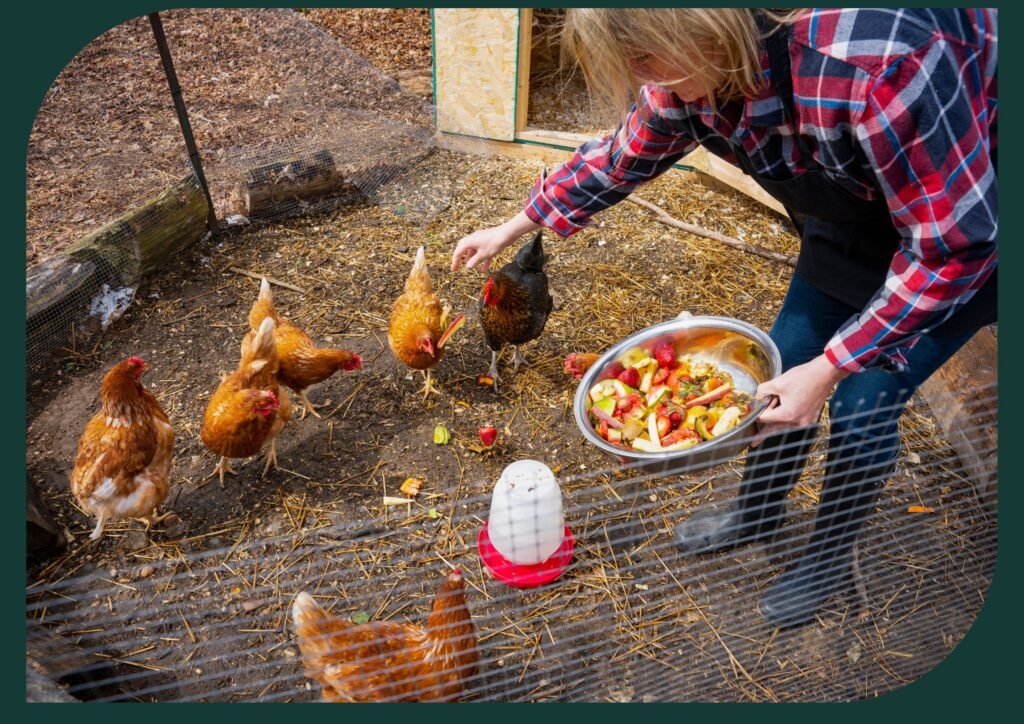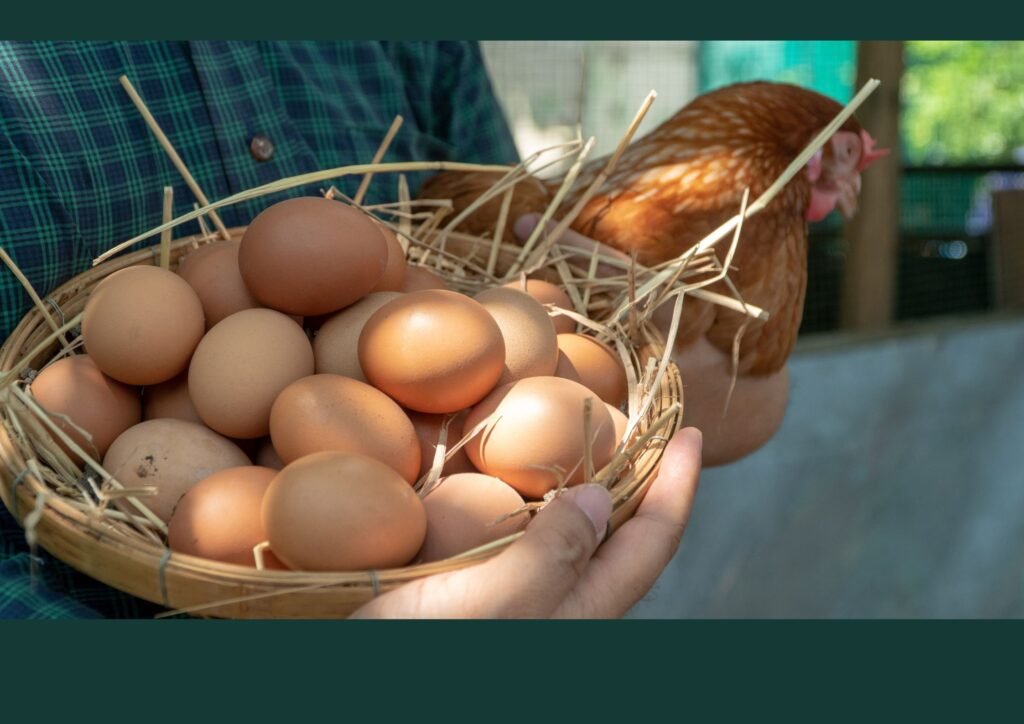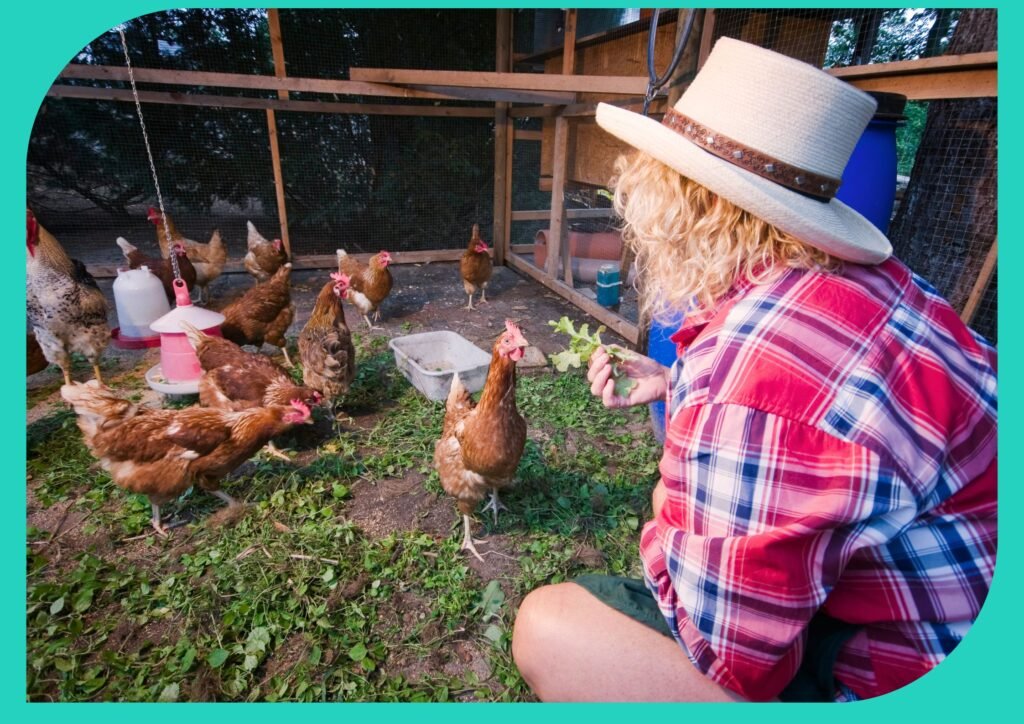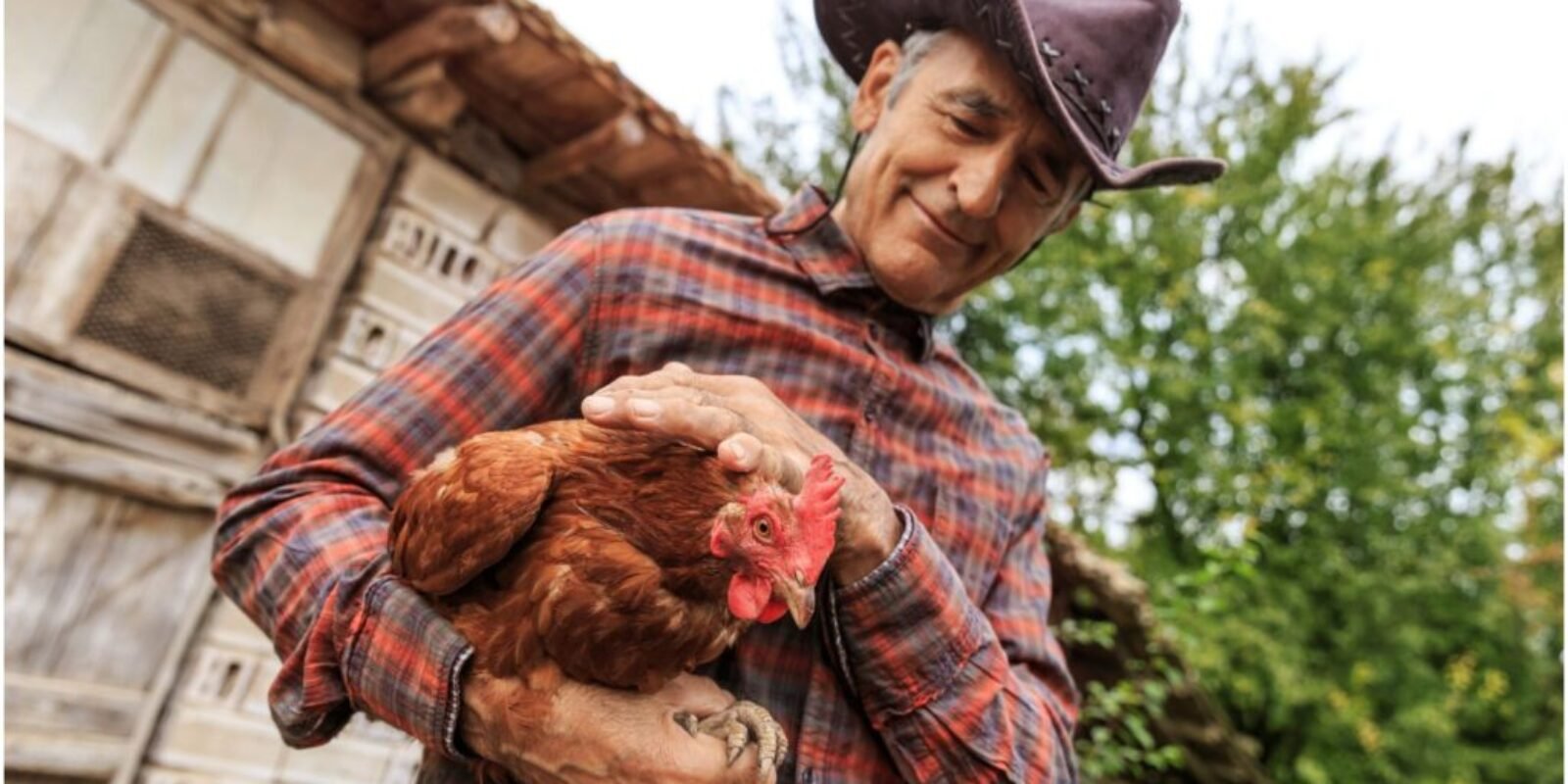Retirement—a time of boundless possibilities, where dreams take flight and new adventures await. And amidst this thrilling journey, there’s one unconventional yet profoundly satisfying path worth exploring—raising chickens!
By embarking on this remarkable journey, you not only unlock numerous benefits but also pave the way for a more sustainable and gratifying lifestyle. So, let’s dive into the captivating world of raising chickens and explore how it can transform your retirement into a truly remarkable and sustainable adventure!
Unlocking the Satisfying Secrets of Retirement through Raising Chickens
This article examines why raising chickens can be a satisfying option for retirement, its beneficial effects, and factors to consider.

A retirement filled with clucks, feathers, and the joy of nurturing these delightful creatures. But that’s not all! By embracing the chicken-raising lifestyle, you’ll unlock a treasure trove of benefits that will make your retirement truly extraordinary.
So, fasten your seatbelts and get ready to dive into the captivating world of chicken-raising, as we uncover the secrets to a fulfilling and sustainable retirement. Let the adventure begin!
Prefer to listen rather than read?
Benefits of Raising Chickens
Prepare to be amazed as we unveil the incredible benefits that come with this clucking revolution, revolutionizing not just your retirement, but your overall well-being.
From the sheer joy of nurturing these charming creatures to the thrill of staying active and relishing farm-fresh, nutritious delights, raising chickens is the ultimate pursuit for a retirement that’s brimming with fulfilment and sustainability.
So, get ready to spread your wings and explore the incredible advantages that await as we embark on this unforgettable journey together!
Emotional Well-being
Caring for chickens can bring immense joy and satisfaction for retirees looking to stay productive. The companionship and bond formed with these delightful creatures can significantly enhance your emotional well-being during retirement. Interacting with chickens can provide a sense of purpose, reduce stress, and alleviate feelings of loneliness.
Physical Activity and Exercise
Retirement often allows more time for engaging in physical activities. Raising chickens entails feeding, cleaning, and maintaining their living quarters, which necessitates consistent physical activity. Such tasks present a prime opportunity to remain active, improve your physical fitness, and sustain a healthy way of life.
Fresh and Nutritious Food
Raising chickens grants access to fresh, organic eggs that are rich in essential nutrients. Adding these nourishing eggs to your diet can enhance your health and well-being.

Having a sustainable food source right in your own backyard is not only rewarding but also contributes to a more environmentally friendly lifestyle. When you raise chickens and have a steady supply of fresh eggs, you eliminate the need to rely solely on store-bought eggs. This simple act of producing your own food has a significant impact on reducing your ecological footprint.
Connection with Nature
Retirement presents an opportunity to reconnect with nature and appreciate its beauty. Raising chickens offers a chance to immerse oneself in the natural world, observe its fascinating creatures’ daily routines, and experience life’s wonders firsthand. This connection with nature can be deeply fulfilling and provide a profound sense of satisfaction.
Things to Consider When You Want to Raise Chickens After Retirement
For many people, raising chickens become an exciting venture during this stage of life. Not only does it provide a rewarding experience, but it also offers numerous benefits.
However, there are important considerations to keep in mind when embarking on the journey of raising chickens after retirement. Here are some key factors that will help you successfully navigate this endeavour:
Space and Infrastructure
Before bringing chickens into your life, it’s crucial to evaluate the space and infrastructure you have available. Determine the appropriate size of the chicken coop or housing structure based on the number of chickens you plan to raise.
Ensure that the coop provides adequate ventilation, protection from predators, and enough space for the chickens to move around comfortably.
Importance of Choosing the Right Chicken Coop
A properly designed chicken coop is crucial for the comfort, safety, and well-being of your chickens. Whether you opt to build your own or purchase a pre-made coop, it is essential to adhere to specific guidelines for creating the best living space for your birds.
Prioritizing the design and construction of a chicken coop is an investment in the health and happiness of your flock. A well-planned coop offers a secure and comfortable space for chickens to roost, lay eggs, and move freely. It protects them from harsh weather and predators while reducing stress factors that may harm their overall welfare.
Size Matters
Whether you possess carpentry skills and enjoy the satisfaction of constructing things yourself or prefer the convenience of buying a pre-fabricated chicken coop, it is essential to follow crucial guidelines. The coop must be spacious enough to house the desired quantity and size of chickens.

Each chicken should have adequate space to extend their wings, scratch the ground, and express natural behaviours without feeling confined. They should have a minimum of two to three square feet of area for optimal movement and exercise. Providing sufficient space contributes to the overall health and productivity of your flock.
Ventilation
Additionally, ventilation is a crucial aspect to consider in coop design. Proper airflow ensures fresh air circulation, prevents the buildup of harmful ammonia fumes, and maintains optimal temperature and humidity levels. Ventilation also aids in minimizing moisture accumulation, preventing respiratory issues and the growth of mould or bacteria.
Easy Access: For Cleaning and Collecting Eggs
Another vital consideration is ensuring easy access to clean the coop and collect eggs. A well-designed coop will have features such as removable trays or sliding floors that make cleaning a breeze. This not only saves you time and effort but also contributes to maintaining a hygienic environment for your chickens.
Material Considerations
If you wish to avoid exposing your chickens to harmful chemicals, it is recommended to avoid coops constructed with treated wood. Opt for untreated or naturally resistant materials to ensure the well-being of your chickens.
In recent years, metal chicken coops have gained popularity due to their durability and versatility. These large-size housing solutions are suitable not only for chickens but also for other animals like rabbits and ducks.
Their galvanized metal frames are robust, rust-resistant, and built to withstand outdoor environments.
Enhanced Security and Protection
Ensuring the safety of your chickens against predators is crucial. Acquire suitable fencing to obstruct bigger predators such as raccoons, foxes, and coyotes. Set up wire mesh flooring in the coop to obstruct burrowing animals from entering. Contemplate implementing motion-activated lights or sound deterrents to repel nocturnal predators.
Metal coops provide superior protection for chickens with wire spacing that prevents paws from snagging or trapping, ensuring the safety of your birds. Water and UV-resistant cover protect them from the elements, and a lockable door adds an extra layer of security.
Breed Selection
Selecting the appropriate breed of chicken is a critical decision that will significantly influence every aspect of your experience in raising chickens. The breed you choose will shape the temperament of your flock, and determine the quantity and quality of eggs they produce.
Even impact their ability to adapt to the specific climate in which they will reside. Therefore, taking the time to carefully consider and research different breeds is of utmost importance in ensuring a successful and fulfilling chicken-raising journey.
Popular Breeds for Egg Laying
In the United States, Rhode Island Reds are a favoured chicken breed for egg production. They’re hardy, adaptable, and friendly, resulting in a steady supply of brown eggs. They’re a common choice among backyard chicken enthusiasts and are well-known for their feed-to-egg conversion efficiency in the US.
While in Canada, The White Leghorn breed stands out as the most popular chicken breed for egg production in Canada. Renowned for its exceptional egg-laying abilities, the White Leghorn is a reliable source of high-quality white eggs.
With their efficient feed conversion and prolific egg production, they have earned a well-deserved reputation as top performers in the poultry world.
Some popular breeds for backyard chicken keeping include Sussex and Orpingtons. Research different breeds and consult with local experts to select the breeds that best suit your needs and preferences.
Popular Breeds For Meat
Certain chicken breeds are highly sought after for their suitability in meat production.
The Cornish Cross breed is widely used due to its rapid growth and substantial breast muscles, resulting in tender and meaty cuts. Sussex chickens are appreciated for their flavorful meat, efficient growth, and high meat-to-bone ratio.

Plymouth Rock, also known as Barred Rock, is a versatile breed commonly used for both meat and egg production. Jersey Giant chickens are notable for their large size, making them suitable for meat production despite their slower growth rate.
The Freedom Ranger breed is specifically bred for pasture-raised meat production, excelling in foraging and adapting to outdoor environments. These breeds are favoured by backyard poultry enthusiasts and small-scale meat producers, although popularity may vary based on location and market demand.
Feeding and Nutrition
Proper nutrition is vital for your chickens’ health and well-being. A balanced diet, including commercial chicken feed, fresh fruits, vegetables, and grains, ensures optimal egg production, strong immune systems, and overall vitality.
Clean water is equally important. Provide clean water at all times using appropriate chicken waterers. Monitor their food intake to avoid overfeeding or underfeeding. Prioritize proper nutrition to support your chickens’ health, productivity, and happiness.
Chickens frequently scratch their food and water, causing contamination. Common pans or bowls are insufficient for containment. Homemade feeders necessitate frequent cleaning and refilling. Automated chicken feeders provide a superior solution.
Automated chicken feeders
These feeders are highly efficient and safe. They allow multiple birds to feed simultaneously and hold up to 50 pounds of grain, minimizing maintenance. Refilling frequency depends on the number of chickens.
They have smart-feeding ports that prevent waste and keep the coop clean. The design also prevents rainwater from entering the feeder and contaminating the feed. Unlike traditional feeders, this one can be easily cleaned and refilled on the ground. The large mouth opening simplifies the process while keeping water out.
Automated Chicken Waterer
An automated chicken waterer is a specialized device that provides constant and clean water for chickens. It eliminates the need for frequent manual refilling by automating the water distribution process.
Equipped with a reservoir, it maintains a consistent water level for chickens to drink from. These waterers promote convenience, save time, and improve hygiene by reducing contamination risks.
They ensure chickens stay hydrated and are especially beneficial for larger flocks or during hot weather. Investing in an automated chicken waterer supports the health and well-being of poultry.
Incorporating automatic chicken feeders and waterers into your chicken-raising routine brings a multitude of benefits that contribute to the overall efficiency and cleanliness of your flock. These innovative devices streamline the feeding process, ensuring that your chickens have access to a consistent supply of food and water without unnecessary waste.
Health Care and Disease Prevention
Ensuring the health of your chickens is of utmost importance for their long-term well-being. To achieve this, it is essential to establish a regular healthcare routine that encompasses various aspects of their care.
Vaccinations
One crucial aspect is vaccinations. Vaccinating your chickens helps protect them from prevalent diseases and strengthens their immune systems. Consult with a veterinarian or poultry health expert to determine the appropriate vaccination schedule and vaccines needed for your specific region and flock.
Parasite-Control
Parasite control is another important component of chicken health care. External parasites like mites and lice, as well as internal parasites like worms, can negatively impact your chickens’ health. Regularly inspect your flock for signs of infestation and implement appropriate treatment measures as advised by a professional.
Regular Check-Up with Vet
Consistent appointments with a veterinarian or avian health expert are crucial for proactive health maintenance. These specialists can conduct comprehensive evaluations, give advice on nutrition, identify early symptoms of disease, and offer preventative care strategies.
Ensuring regular check-ups guarantee that any potential health concerns are treated without delay, resulting in superior results for your poultry.
Common Chicken Diseases
Familiarize yourself with common chicken diseases and their symptoms to be able to identify potential issues early on. Monitor your flock closely for any signs of illness such as lethargy, reduced appetite, changes in droppings, respiratory distress, or unusual behaviour.
Acting swiftly and seeking professional advice when needed can make a significant difference in the health and recovery of your chickens.

Maintaining good hygiene practices in the chicken coop is crucial for disease prevention. Regularly clean the coop, remove accumulated waste, and provide clean bedding. Keep food and water sources clean and free from contamination. Proper ventilation and adequate space in the coop also contribute to a healthier environment for your chickens.
Implementing biosecurity measures is essential to prevent the spread of diseases. Restricting access to your flock, practising proper sanitation, and disinfecting equipment and footwear can help minimize the risk of introducing or transmitting pathogens.
Limiting contact with other poultry or wild birds and practising good biosecurity protocols when introducing new chickens to your flock are additional measures to consider.
Daily Care and Maintenance
Raising chickens is a fulfilling undertaking that requires unwavering and devoted attention. To guarantee the welfare of your brood, it is imperative to implement a daily regimen that encompasses several duties.
The foundation of this regimen involves dispensing routine feedings, guaranteeing that your chickens obtain the essential nutrients for their development and liveliness. In conjunction with feeding, it is vital to furnish uncontaminated and novel water, as hydration is imperative for their comprehensive well-being.
Maintaining a clean and hygienic coop environment is equally important. Regularly cleaning the coop helps prevent the buildup of waste and keeps the chickens safe from harmful bacteria and parasites. Moreover, a clean coop promotes good ventilation and reduces the risk of respiratory issues.
In addition to daily care, inspecting the coop on a regular basis is essential. Look out for any signs of damage or wear, such as cracks in the walls or holes in the fencing. Repairing these issues promptly ensures the safety and security of your chickens, protecting them from potential predators.
Legal Considerations
When embarking on the journey of raising chickens, it is crucial to acquaint yourself with the local regulations and restrictions that govern poultry keeping in your area. Different neighbourhoods and municipalities may have specific guidelines in place to maintain harmony within the community.
These regulations can encompass various aspects, including the permissible number of chickens, restrictions on noise levels, and regulations regarding the placement and construction of coops.
To avoid any unforeseen complications or conflicts, it is essential to familiarize yourself with these legal requirements and ensure that you adhere to them diligently. Understanding the limitations and expectations set by your local authorities will not only ensure compliance but also promote positive relations with your neighbours and the community as a whole.
Start by researching the zoning laws or ordinances that pertain to poultry keeping in your specific area. Check if there are any restrictions on the number of chickens you can keep or if there are any noise limitations that apply to the crowing of roosters.
Additionally, familiarize yourself with any regulations regarding the placement and construction of coops, including setback distances from neighbouring properties.
By proactively complying with these regulations, you can enjoy the experience of raising chickens without causing any disturbances or legal issues. Being a responsible and considerate poultry owner fosters a harmonious coexistence within the community and helps to preserve the positive image of backyard chicken keeping.
Remember, taking the time to understand and adhere to local regulations regarding raising chickens is an important step towards ensuring a smooth and hassle-free experience for both you and your neighbours. By doing so, you can create an environment that promotes mutual respect and enjoyment for everyone involved.

Conclusion
Raising chickens after retirement can be a rewarding and fulfilling experience. By considering factors such as space and infrastructure, breed selection, feeding and nutrition, health care, predator protection, chicken socialization, daily care, and legal considerations, you can create a safe and nurturing environment for your feathered companions.
Embark on this exciting new chapter of your life with enthusiasm and open arms, embracing the numerous rewards that come hand in hand with raising chickens. It’s a journey that offers a myriad of benefits and enriching experiences for seniors that are retiring soon.



















